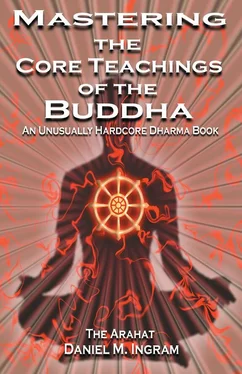Daniel Ingram - Mastering the Core Teachings of Buddha - An Unusually Hardcore Dharma Book
Здесь есть возможность читать онлайн «Daniel Ingram - Mastering the Core Teachings of Buddha - An Unusually Hardcore Dharma Book» весь текст электронной книги совершенно бесплатно (целиком полную версию без сокращений). В некоторых случаях можно слушать аудио, скачать через торрент в формате fb2 и присутствует краткое содержание. Год выпуска: 2009, ISBN: 2009, Издательство: Aeon Books, Жанр: Старинная литература, на русском языке. Описание произведения, (предисловие) а так же отзывы посетителей доступны на портале библиотеки ЛибКат.
- Название:Mastering the Core Teachings of Buddha - An Unusually Hardcore Dharma Book
- Автор:
- Издательство:Aeon Books
- Жанр:
- Год:2009
- ISBN:9781904658405
- Рейтинг книги:5 / 5. Голосов: 1
-
Избранное:Добавить в избранное
- Отзывы:
-
Ваша оценка:
- 100
- 1
- 2
- 3
- 4
- 5
Mastering the Core Teachings of Buddha - An Unusually Hardcore Dharma Book: краткое содержание, описание и аннотация
Предлагаем к чтению аннотацию, описание, краткое содержание или предисловие (зависит от того, что написал сам автор книги «Mastering the Core Teachings of Buddha - An Unusually Hardcore Dharma Book»). Если вы не нашли необходимую информацию о книге — напишите в комментариях, мы постараемся отыскать её.
Mastering the Core Teachings of Buddha - An Unusually Hardcore Dharma Book — читать онлайн бесплатно полную книгу (весь текст) целиком
Ниже представлен текст книги, разбитый по страницам. Система сохранения места последней прочитанной страницы, позволяет с удобством читать онлайн бесплатно книгу «Mastering the Core Teachings of Buddha - An Unusually Hardcore Dharma Book», без необходимости каждый раз заново искать на чём Вы остановились. Поставьте закладку, и сможете в любой момент перейти на страницу, на которой закончили чтение.
Интервал:
Закладка:
Further, as a part of our empowerment, we assume that the more of our resources and abilities we bring to this training, the likelier we will be to succeed. We have a body, we have reason, we have our intuition, we have our heart, and we have ability to learn and remember. We have a community of others with wisdom to share, we have books and other media that contain advice for living the good life, and we have our friends and family. We can draw on all of this and more to try to live a good life, a life where our thoughts, words and deeds reflect as closely as possible the standards we have consciously adopted and defined for 5
Morality, The First and Last TrainingMorality, The First and Last Training
ourselves. The more consciously engaged we are with our task, the more we are likely to be successful.
Crucial to the control of what happens in our lives is our intent.
Thus, training in morality places a lot of emphasis on intent, with the basic assumption being that the more our intentions are kind and compassionate, the more we are likely to be able to manifest kind and compassionate thoughts, words and deeds.
Further, it is helpful to assume that training in morality requires us to pay attention to what is happening in our lives. When we are not paying attention to what we are thinking, saying and doing, we will not easily be able to craft these in a way that fits with the assumptions of this training. If we are not paying attention to what the consequences of our thoughts, words and deeds are, both in the short term and the long term, we are unlikely to be able to gain enough experience to be able to guide our training in morality successfully.
It is also helpful to assume that training in morality will help us when we get to formal meditation practices (the next two trainings in concentration and wisdom), providing a foundation of good mental and physical habits that can support those practices. Thus, even if we have little interest in being moral because of the benefits it can bring, if we are interested in obtaining the results of the other two trainings, we should also engage in training in morality.
These assumptions naturally lead to the specific agendas we have for what happens when undertaking training in morality. We consciously aspire to have the actions of our body, speech and mind live in a way that fits with the assumptions of this training. In short, we have standards for our mental, emotional and physical lives and we try our best to live up to those standards. When we are working on training in morality, we consciously cultivate actions, words and thoughts that we deem to be kind and compassionate. By “kind,” I mean that we work to promote the happiness and welfare of ourselves and others. By “compassionate,”
I mean that we work to relieve the suffering of ourselves and others.
Thus, our agenda is for our intentions to be kind and compassionate, for our minds to be aware of what we are thinking, saying, and doing, and for our experience to tell us as best it can how to craft our life to reflect our intentions.
6
Morality, The First and Last TrainingMorality, The First and Last Training
Training in morality tends to be discussed in terms of what one shouldn’t do and also what one should do. The standard Buddhist short-list of the five things that one should try to avoid, called “The Five Precepts” are: killing, stealing, lying, taking mind altering substances that lead to heedlessness, and using sexual energy in ways that are harmful.
These are obviously not unique to Buddhism, and seem to be part of the basic set of standards for behavior that societies and cultures throughout the ages have found to be helpful and practical. The standard list of things that one should try to do includes being kind, compassionate and appreciative of the successes of others.
Wrestling with the question of how we can meet this fairly
reasonable standard and yet honor where we are and what is going on around us is the practice of this first training. We will make all kinds of mistakes that can be very educational when trying to work on this first training; if you mess up, remember to be kind to yourself!
There are many great techniques for cultivating a more decent way of being in the world, but there are no magic formulations. You must figure out how to be kind to yourself and all beings in each moment. As training in morality takes into account all of the ordinary ways in which we try to live a good and useful life, it is so vast a subject that I couldn’t possibly give anything resembling a comprehensive treatment of it here.
However, if you wish for further elaboration on some of the basics of training in morality, I suggest that you check out some of the following works:
For a
Future to be Possible , by Thich Nhat Hanh
A Heart as
Wide as the World and Lovingkindness, the
Revolutionary Art of Happiness, both by Sharon Salzburg
Light
on Enlightenment , by Christopher Titmuss
A P
ath With Heart , by Jack Kornfield
Training in morality at its best is grounded in a theoretical or direct appreciation of one more assumption, that of interconnectedness.
Interconnectedness at this level means an appreciation of the fact that we are all in this together and that we all share the wish to be happy.
When we take into consideration our own needs and the needs of those around us, we are more likely to be naturally kind and considerate of ourselves and others. Thus, we try to make it a habit to try to take into 7
Morality, The First and Last TrainingMorality, The First and Last Training
account the feelings, opinions and welfare of those around us. The obvious trap here is to simultaneously fail to take into account our own needs. Work on balancing both in a way that is sustainable and healthy.
There are countless other pitfalls we can run into when training in morality, as it is such a vast area of work. I will spend a lot of time in Part II detailing some of the more common side effects and shadow sides of training in morality, but realize that it is an endless subject.
However, one pitfall that must be addressed here, as it is so common, is that of guilt. We have grown up in a culture in which we can be extremely hard on ourselves, causing ourselves astounding amounts of pain to little good effect. If we can learn to substitute wise remorse, a remorse that simply says, “Well, that didn’t work, and this is unfortunate. I should try my best to figure out why and hopefully do something better next time,” we will be much more able to train successfully in living a good and useful life.
Some people unfortunately seem to think that the primary message of training in morality is that they should continuously cultivate the feeling that they have taken up a heavy yoke of responsibility and self-oppression. In fact, some people seem to revel in that unfortunate feeling. Those more fortunate will think, “It is so much fun to try to live a good, healthy and useful life! What a joy it is to find creative ways to do this!” There are few things more helpful on the spiritual path and life in general than a positive attitude.
Thus, the related and all too common pitfall is that people stop having fun and trying to be successful in worldly terms. There is absolutely no reason for this. If you can have fun in healthy ways, have fun! It’s not just for breakfast anymore. Also, success is highly recommended for obvious reasons. Pick a flexible vision of success in the ordinary sense for yourself and go for it! Play to win. This is your life, so make it a great one. There is no reason not to try, so long as you can do so in a kind and compassionate way.
One more great thing about the first training is that it really helps with the next training: concentration. So, here's a tip: if you are finding it hard to concentrate because your mind is filled with guilt, judgment, envy or some other hard and difficult thought pattern, also work on the first training, kindness. It will be time well spent.
Читать дальшеИнтервал:
Закладка:
Похожие книги на «Mastering the Core Teachings of Buddha - An Unusually Hardcore Dharma Book»
Представляем Вашему вниманию похожие книги на «Mastering the Core Teachings of Buddha - An Unusually Hardcore Dharma Book» списком для выбора. Мы отобрали схожую по названию и смыслу литературу в надежде предоставить читателям больше вариантов отыскать новые, интересные, ещё непрочитанные произведения.
Обсуждение, отзывы о книге «Mastering the Core Teachings of Buddha - An Unusually Hardcore Dharma Book» и просто собственные мнения читателей. Оставьте ваши комментарии, напишите, что Вы думаете о произведении, его смысле или главных героях. Укажите что конкретно понравилось, а что нет, и почему Вы так считаете.












